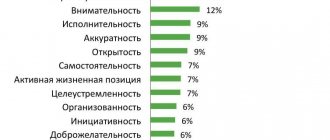One of the most common interview questions that most of us have heard or will hear at some point is, “What are your strengths and weaknesses?”
This article will provide a list of strengths and weaknesses that you can mention in an interview, as well as a variety of answer options that may impress your recruiter.
# How to identify weaknesses
It is difficult to determine on your own what shortcomings you have, and even more difficult to accept them, so you can turn to friends or family for help. Ask them to be honest about your character weaknesses - listen carefully. This way you can analyze what was said, draw conclusions and start working on yourself!
Character is the established mental properties of a person, which are reflected in behavior and actions. And character traits are the qualities of a person that he displays in society. They can be both positive and negative.
Also remember what you were told at your previous place of work, what you were praised for and what you were blamed for. Admit honestly what you don’t like about yourself, look at yourself from the outside - this way you will understand where your strengths and weaknesses are. Once you realize this, you will become much stronger and wiser.
What to write
Before filling out the box in which you need to indicate your shortcomings, think about your answer. Do not miss it under any circumstances, because ideal people do not exist. As a rule, managers want to see how adequately you evaluate yourself. If you don't know what to write, look at the suggested options and choose something that suits you best.
A universal formula: select character traits that are an advantage for performing this particular job, but in ordinary life can really be considered a human flaw.
The following weaknesses can be written:
- excessive directness, the habit of telling the truth face to face;
- difficulty establishing contact with strangers;
- inability to show flexibility in labor matters;
- reliability;
- increased anxiety;
- excessive emotionality, hot temper;
- love of formalism;
- restlessness;
- slowness;
- hyperactivity;
- fear of air travel.
All of the weaknesses listed in your resume can become strengths if you look at them from a different angle. An example is restlessness. For a sales representative or active sales manager, this can even be a plus. The same goes for reliability. This is a signal to the manager that you may be the person who will do all the overtime work.
Good to know: Personal qualities for a resume
# How to turn disadvantages into advantages
When answering a question about weaknesses, you should not specifically show your imaginary “good weaknesses,” otherwise you will cause distrust.
Bosses have a stereotype: if a person wants to show only good things, then he is probably hiding something bad in himself and maybe he doesn’t even realize it.
It is important to show that you know your weaknesses, recognize them and know how to deal with them. This is the kind of presentation that will make a positive impression on the employer.
Expert opinion
Ekaterina Troitskaya
HR manager
It will be difficult to fully turn minuses into pluses in the questionnaire. Therefore, it is better to highlight a line in your resume and indicate that there are many more advantages, and the disadvantages do not affect the work in any way. But when talking with a boss or an interviewer at an interview, character weaknesses should be revealed with a smooth switch to strengths.
Example: I can be meticulous and scrupulous. This irritates many people. But it seems to me that as an analyst I simply do not have the right to treat tasks differently, and therefore I am used to checking everything several times and analyzing everything down to the smallest detail. I can’t work calmly until I recheck everything completely several times.
You can also indicate that you are working on your weaknesses and doing everything possible to improve:
Example: I'm not a very good speaker. I can become confused and stutter when I'm in front of a lot of people. I realize that for a journalist this is a clear disadvantage, which is why I signed up for public speaking courses. And I’m even glad that I can develop and work on myself, realizing my shortcomings.
You can use the method of compensating for negative qualities if you realize that you cannot turn them into positive ones, and you can no longer fight:
Example: I'm an owl. Getting up early is very difficult for me. This could make me late for work. But I’m ready to compensate for this; I can happily stay late in the office to complete all the errands. After all, my productivity increases in the evening, so I will happily do everything that is necessary, and I can even complete urgent additional assignments.
Good examples of disadvantages that can be turned into advantages are the following:
- Distrustful - a person who will only enter into transactions with trusted companies.
- Excessive self-confidence - you will be seen as a leader who is always moving forward.
- Increased anxiety – a responsible approach to work, in other words, fear of making mistakes.
- Demandingness - if you are demanding of yourself, then of your work and your subordinates too.
- Self-criticism - you are responsible and do quality work.
- Shyness - you will not have conflicts with colleagues and be polite with your superiors.
Human strengths
It is known that among us ordinary people there are no “saints”. And each person has his own advantages and disadvantages. Therefore, it is worth paying attention to the first of them. In order to “shine” in live speech during an interview and live communication, think in advance about the qualities that you think are inherent to you.
An example of a good list of a person's strengths:
- Communication skills;
- Determination;
- Integrity;
- Performance;
- Friendliness;
- Stress resistance;
- Responsibility;
- Punctuality, etc.
If you list at least some of the above traits and qualities, that's half the success. If the manager sees how seriously you approach this issue, he will appreciate your ability to correctly express thoughts and convey the essence. You should not praise yourself and promise what you cannot fulfill.
For example, if you do not specialize in a particular industry, but you are asked provocative questions about a specific problem, it would be more honest to answer that you do not yet have such skills, but are striving and want to expand your boundaries and skills. Then the employer will be able to appreciate your honesty and desire to develop and climb the career ladder.
The future leader may ask you tricky questions, the answers to which will not be entirely convenient. The candidate's endurance and ability to get out of difficult situations are tested in this way.
It doesn't seem right. But if you are applying for a good position with a high salary and you will be required to be able to communicate with people competently and without emotions, then you must have self-control and discipline.
A potential employer, through live communication, will be able to identify your strengths and weaknesses and draw conclusions about your personality.
The manager will also ask you about your strengths and weaknesses. You should not take this issue seriously and completely remove all the “skeletons” from the closet. It will be enough if you name some minor shortcomings: for example, shyness. This little vice rarely deters. Therefore, there is no need to worry about this.
To avoid embarrassment during an interview and personal conversation with a potential employer, make a list of your strengths in advance. It will be useful for you to analyze your mentality and character, thereby you will be ready for such a question and will not be confused.
Take a blank piece of paper and start writing down the qualities that you are proud of. For example, kindness, understanding, responsiveness, sociability, learning ability, etc. This is a kind of training. You will be able to objectively evaluate your pros and cons. And in advance, you can write a list of those qualities that you do not possess, but are trying to develop in yourself. This will give you a push and incentive to change.
# Number of negative aspects in a resume
Expert opinion
Ekaterina Troitskaya
HR manager
The employer is interested in learning about the weak character traits of the applicant, as well as about the strong ones. But writing a 2-page story about yourself is not worth it. It is enough to indicate 3 negative character traits.
If you write more negative aspects in your resume, this may negatively affect your business reputation and raise suspicions of unprofessionalism.
Strengths and weaknesses of a leader
Additionally, you may be asked what qualities and personal merits you would like to see in your boss. It’s worth thinking about the answer to this question in advance. For example, you can say what you want to see in a leader:
- Determination;
- Restraint;
- Responsiveness;
- Demandingness;
- Communication skills;
- Individual approach to employees;
- Decisiveness, etc.
You won't be asked questions like this for nothing. After all, every employer wants to see what the employee expects from his superiors. If you answer adequately and your potential boss likes you, you will get a permanent position.
# Inappropriate negative character traits
Do not indicate disadvantages if they go against direct responsibilities. For example, shyness that is suitable for a programmer is not at all suitable for a fitness trainer. Therefore, the column must be drawn up based on the specifics of the desired position.
Below are examples of a bad combination of qualities and future profession. Please note that for excellent positions, shortcomings are quite acceptable.
Weaknesses of a person, their list
Now let's try to consider the weaknesses of human character. Most often, when trying to get a job, during the interview the employer may notice some shortcomings of the future candidate for the position. For example, he may be alarmed by inattention, absent-mindedness and slurred speech.
Consider a list of the most common human shortcomings and weaknesses:
- Indecisiveness;
- Emotional stiffness;
- Shyness;
- Timidity;
- Coarseness;
- Rudeness, etc.
When talking, try to tell your boss about your interests, hobbies, and a little about the family in which you grew up. In this way, you will win over the employer, and he will appreciate your aspirations and see that you are ready to do a lot for the sake of work. Honesty and unobtrusive frankness will benefit you.
# What shortcomings to indicate in a resume - examples
If an applicant refuses to fill out an item about personal weaknesses, this may raise suspicion. Therefore, it is better to mention flaws, but do it competently. There are neutral deficiencies that can be indicated on the application form. For example:
- I don’t know how to respond to rudeness with rudeness;
- I sometimes have a critical attitude towards people;
- Tendency to stick only to one’s own;
- I can’t always express my thoughts quite clearly;
- I am overweight and I am embarrassed about it;
- I devote a lot of time to evaluating my actions and actions;
- I take a lot of things to heart;
- I'm afraid of heights and flying on an airplane;
- I don’t like moving and business trips;
- I can’t live without sweets and coffee;
- I'm afraid of spiders and insects;
- I can’t swim and I’m afraid of drowning;
- It takes me a long time to fall asleep at night.
- Too trusting;
- I don’t like to act to please others;
- I don’t like to make trouble and swear, even when necessary;
- I don't know how to flatter.
A universal method for writing shortcomings: select a few of your strengths and add the prefix of exaggeration - too responsible, too honest, too pedantic.
But there are also qualities that should not be advertised in order to avoid a negative impact on the recruiter:
Do you hide your shortcomings?
Not really
- Laziness or passivity;
- Fear of responsibility;
- Lack of punctuality;
- Distraction of attention;
- Self-interest, I think only money;
- Love for office romances;
- Conflict person;
- Habit of lying;
- Absent-mindedness.
# Examples for the seller
Sales is a common profession, but when applying for a job you may be asked to voice your weaknesses. Therefore, you should be prepared for this. The following qualities will not cause indignation among the employer, but on the contrary will interest him:
- excessive sociability, talkativeness;
- increased activity;
- excessive self-confidence;
- need for motivation;
- distrust of people.
# Examples for an accountant
In order to look favorably against the background of other candidates for an accountant vacancy, you can present the following qualities:
- inability to lie;
- self-esteem;
- lack of agreement in work situations;
- scrupulousness;
- inflated sense of responsibility;
- taking other people's problems to heart.
- distrust;
- excessive pedantry;
- increased anxiety;
- straightforwardness;
- scrupulousness;
- modesty;
# Examples for a manager
For a manager, it is more profitable to indicate completely opposite weaknesses in a resume. For example, you can use:
- weak perseverance;
- hyperactivity;
- excessive demands;
- impudence;
- stubbornness;
- self-confidence;
- straightforwardness;
- impulsiveness.
# Examples for a manager
Leaders can pay attention to those negative character traits that contribute to being a leader in a team. These qualities, in moderate quantities, even help in leadership positions:
- narcissism;
- excessive demands on people;
- excessive dramatization of events;
- strict adherence to the rules;
- authoritarianism;
- rigidity;
- stubbornness.
For all occasions
Many people are afraid to write about shortcomings, believing that the employer will immediately send their resume to the trash bin. Of course, you shouldn’t be too frank, but you shouldn’t completely skip this section of the questionnaire. In this case, you can write about some neutral qualities that will not affect your work in any way. For a person applying for any vacancy, among the inherent weaknesses one can indicate:
- fear of airplanes;
- arachnophobia (fear of spiders), vespertiliophobia (fear of bats), ophidiophobia (fear of snakes);
- excess weight;
- lack of experience;
- age (suitable for people over 40 years old);
- love of shopping;
- love for sweets.
This information does not characterize you in any way, it simply speaks about your fears or small weaknesses.
Good to know: What are key skills for a resume?
The following disadvantages can be mentioned:
- I don’t always express my thoughts accurately;
- I trust people too much;
- prone to reflection;
- I often analyze past mistakes, focusing too much attention on them;
- I spend a lot of time evaluating my actions.
These are negative qualities, but they should not affect the work process.
Regardless of the position for which you are applying, you can write the following weaknesses in your resume:
- I get so carried away with work that I forget to take breaks;
- I can’t build relationships with colleagues because I don’t like gossip;
- I can’t fight back in response to boorish treatment;
- I constantly pass all situations through myself;
- I let people get too close;
- I don’t know how to swear;
- I get noticeably worried when I have to lie.
About SWOT
The so-called SWOT analysis appeared in the middle of the last century during research carried out by specialists at Stanford University. They analyzed the activities of prosperous US companies. It turned out that there is a serious discrepancy between the planned and actual state of affairs - approximately 35%. The reason turned out to be very simple - the employees were simply not given clear tasks. The result of the study was the SWOT analysis technique, the importance of which is that it can be used both in solving business problems and personal ones - for example, developing personal relationships or career growth.
The essence of a SWOT analysis of a person is an assessment of resources, opportunities in relation to the desired goal, a comprehensive view of the situation and, accordingly, the choice of a new strategy. The abbreviation reveals four characteristics that need to be worked with:
- S (Strengths) – human strengths;
- W (Weaknesses) – human weaknesses;
- O (Opportunities) – opportunities;
- T (Threats) – threats.
Objective disadvantages
A special case consists of fundamental aspects of the work history, life history or health status, which may negatively affect the professional suitability of the applicant. Is it advisable to note such shortcomings or is it wiser to remain silent about them? Of course, if there is a corresponding column in the applicant’s application form, it is more rational to indicate truthful information, otherwise unpleasant information will be revealed during an interview or during a check by the company’s security service. If the employee’s exact compliance with certain parameters is important for the employer, it is better to find out this at the stage of sending the resume. Objective imperfections can be divided into the following categories:
- lack of experience or irrelevant (that is, useless for the position being sought) skills;
- unsightly aspects of the biography (long break in work experience, criminal record, etc.);
- inconsistency with the position in terms of age, nationality, citizenship, gender;
- significant deviations in health;
- bad habits.
Possibilities
Your capabilities are everything that can increase your value as a specialist or just a person - list in this block: all kinds of courses and schools, knowledge of languages and diplomas; everything you can improve - skills, appearance; acquaintances and cooperation with companies and people, successfully held events - all are an asset to opportunities. Think carefully about your answers to these questions:
- What knowledge do you want to gain?
- What training courses can you sign up for right now (with enough time and money)?
- What about yourself can you improve if you devote time and money to it?
By implementing opportunities, you can significantly strengthen the first and very important block - your “strengths”. SWOT analysis is what is necessary to achieve the goal.
What weaknesses are not worth mentioning?
The basic rule for filling out this item in a resume is the number of specified traits (no more than three) and their combination with professional responsibilities. But there are aspects of human character that under no circumstances should be included in a resume.
A potential employer will probably not want to consider a resume where the applicant has indicated the following among his weaknesses:
- passivity, laziness and carelessness;
- I constantly fly in the clouds;
- not ready to make decisions;
- you cannot concentrate on completing the task at hand, you are often distracted;
- lack of punctuality;
- conflict;
- absent-mindedness;
- selfishness;
- amorousness;
- habit of lying.
We recommend that you familiarize yourself with examples of character strengths and weaknesses in a resume.
How to analyze your abilities
To describe a person’s weaknesses for a questionnaire, it is necessary to carefully understand the character, habits, and internal attitudes. Would you say that only a specialist can do this? You will be wrong! Now you will see everything for yourself. Sit comfortably, armed with a pen, and make lists. Enter in the hotel columns the following:
- works well;
- likes to perform;
- It doesn’t work out at all;
- still needs to be mastered;
- causes disgust;
- it is done, but with a creak, without enthusiasm.
If you approach this process thoroughly, you will get the basis for identifying a person’s weaknesses for the questionnaire. This is, in principle, what specialists do. They extract this information during conversation, observation, and testing. But you know yourself, and therefore things will go faster. And to make your work easier, here is a list of what are considered weaknesses. Focus on this data, but try not to copy it. Use your own brains!










